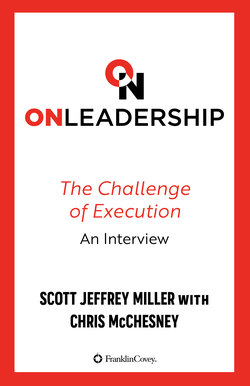Читать книгу On Leadership - Scott Jeffrey Miller - Страница 6
На сайте Литреса книга снята с продажи.
ОглавлениеThe Journey to Execution
There’s a reason authors talk about the process of “birthing” a book—it’s an act of love, endurance, work, pain, and hopefully in the end, joy. For Chris, this process began twenty-eight years ago, when he was in the office of Dr. Stephen R. Covey. He realized that with The 7 Habits of Highly Effective People, Dr. Covey had a decade’s worth of experiences and stories to draw from before he put pen to paper. Chris and his team followed a similar path, working with many organizations over the years and generating a wealth of stories and experiences around execution. When Chris and his co-authors (Sean Covey and Jim Huling) wrote The 4 Disciplines of Executions in 2012, the team had over 2,000 implementations to draw from. Much as Stephen R. Covey had done, Chris and his co-authors synthesized their deep well of execution experiences into a practical and usable form.
The Challenge of Execution
Execution can be defined as performance. Leaders who execute inspire high levels of performance by creating the conditions in which execution thrives. But when execution breaks down, the results are painfully clear: goals remain unobtained, strategies fall by the wayside, innovation takes a back seat, and morale suffers. Chris and his team explored the challenge of execution by accepting that a simple human dynamic was at work: people default to doing the “urgent” over the “important.” As the rush of daily urgencies comes to a head (what Chris and his co-authors call the “whirlwind”), strategy takes a back seat.
“A simple human dynamic is often at work: people default to doing the ‘urgent’ over
the ’important.’ ”
Chris shares that the urgency of the whirlwind can be found in activities like the unending flood of email, recurring meetings, or the countless hours spent talking on the phone—all of which distract from more important activities because the whirlwind feels rewarding—we get a little dopamine trigger every time we get something done, even if that something wasn’t so important. During a crisis, however, organizations shift their focus away from the whirlwind. Addressing the emergency becomes the all-consuming focus as teams set their “day job” activities aside. It’s a rare moment when a strategic initiative trumps the daily “to-do” list, but when it happens, organizations are often good at executing.
Now, imagine being able to execute and drive performance without having a crisis as a catalyst. That’s what Chris and his team are all about.
Recognizing the effects of the whirlwind begged an important question: How do you execute in the face of overwhelming distractions? It’s working from such a perspective that continues to differentiate Chris’ work from other goal-setting modes, methodologies, or approaches. And as it turned out, the answer to overcoming the whirlwind and realizing high performance wasn’t about executing against an entire business model, but enacting the 4 Disciplines at the team and individual level.
“How do you execute in the face of overwhelming distractions?”
The 4 Disciplines
Chris likes to repeat something he learned from Stephen R. Covey: “Best practices are a dime a dozen, but principles are everything.” This idea helped him approach execution through the lens of four underlying principles: focus, leverage, engagement, and accountability. When the four principles are put into action, they become “disciplines.” Thus, the book is titled The 4 Disciplines of Execution and not The 4 Principles of Execution. The focus is on how the underlying principles manifest and can be adopted by others.
Chris will often begin his consulting engagements by asking leaders, “What lives at the intersection of ‘Really Important’ and ‘Ain’t Gonna Happen’?” It’s the kind of question that often makes people uneasy at first. But in Chris’ experience, everyone has an answer. He can see it on a leader’s face as they realize some of their most important initiatives live at that undesirable address. And that’s when the 4 Disciplines—the execution principles in action—becomes the treatment.
“Focus, leverage, engagement and accountability: When the four principles are put into action, they become ‘disciplines.’ ”
Discipline 1: Focus on the Wildly Important
Focusing on the Wildly Important is about the practice of targeting. It’s about narrowing the focus to what Chris calls a WIG® or Wildly Important Goal®. Practically, it means taking a conceptual idea a leader wants to execute and putting it in the form of a starting line, finish line, and deadline. In an organizational setting, a WIG usually starts off as a single metric and then cascades to the fewest number of executable targets. It is the goal one must achieve with total excellence beyond the whirlwind’s circling priorities of the day-to-day.
“Practically, it means taking a conceptual idea a leader wants to execute and putting it in the form of a starting line, finish line, and deadline.”
Discipline 2: Act on the Lead Measures
